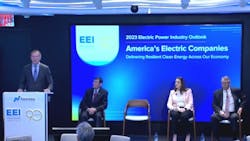EEI Delivers Annual Industry Outlook to Wall Street
Edison Electric Institute (EEI) President Tom Kuhn and other members of EEI’s executive leadership team last month briefed Wall Street analysts, bankers, and investors on the state of the U.S. electric power industry.
“EEI and our member companies—America’s investor-owned electric companies—are at a global inflection point,” said Kuhn. “We remain focused on ensuring that customers have the energy they need when and where they need it, affordably and reliably, as we work to get this energy as clean as we can as fast as we can. And, we have fully embraced a strategy that will deliver secure and resilient clean energy across our economy.”
Thanks largely to the leadership of EEI’s member companies, carbon emissions from the U.S. electric power sector today are as low as they were almost 40 years ago, despite electricity use climbing 73 percent since then. More than 40 percent of America’s electricity now comes from clean, carbon-free sources, including nuclear energy, hydropower, wind, and solar energy.
Kuhn told the audience that, following passage of the Bipartisan Infrastructure Law and the $272-billion clean energy tax package in the Inflation Reduction Act—laws which EEI strongly supported—there are more tools available than ever to help address climate change by facilitating investments in smarter, more resilient energy infrastructure and the deployment of more clean energy. “Importantly, the critical cost-savings benefits of the tax provisions flow directly through to our customers,” he said.
During the presentation, EEI also highlighted the need for siting and permitting reform to facilitate investment in much-needed critical energy infrastructure, including transmission, renewable energy facilities, and natural gas pipelines and facilities. EEI supports environmental and regulatory processes that are clear, coordinated, consistent, transparent, and as efficient as possible, while meeting environmental requirements.
EEI’s executive team also addressed other industry priorities, including ESG; the role of new and developing carbon-free technologies; electric transportation; energy grid reliability, resilience, and security; federal and state regulations; workforce development and diversity, equity, and inclusion; financial performance; and ongoing efforts to meet customer expectations and to support customers in need.
“Over the past 90 years, EEI and our member companies have demonstrated a strong record of progress in serving customers,” said Kuhn. “Together, we have delivered Power by Association and have created powerful momentum to carry forward our vision for a resilient clean energy future.”
